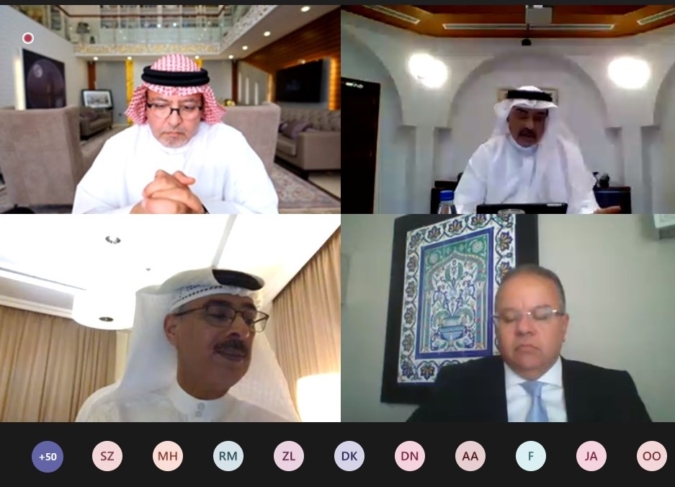The Bahrain Red Crescent Society (BRCS) participated in the “International Humanitarian Law in the era of Covid-19” symposium, organized by the Judicial and Legal Studies Institution in cooperation with the National Committee for International Humanitarian Law and the International Committee of the Red Cross. The symposium concentrated on the humanitarian situation in the world, especially in conflict areas and the role of the international movement of the Red Cross and Bahrain Red Crescent Society, the role of the armed forces in assisting national authorities during efforts to tackle COVID-19 in the framework of civil-military cooperation, and the legislative system of international humanitarian law in the Kingdom of Bahrain in the light of the new emblem law.
The Minister of Justice, Islamic Affairs and Waqf, the Chairman of the National Committee for International Humanitarian Law, His Highness Sheikh Khalid bin Ali Al Khalifa, started the symposium by praising the efforts of the regional delegation of the International Committee of the Red Cross and its role in promoting partnerships for humanitarian and relief work, and its contributions to spreading the principles of international humanitarian law. “Humanitarian aid should be allowed with no restrictions, and there must be continuous understanding between the entities that wish to help, also protected areas and facilities must be expanded to include medicine and masks factories and quarantine areas.” Sheikh Khalid said.
The symposium witnessed speeches and lectures by Mr. Omar Odeh, the head of the regional mission of the International Committee of the Red Cross in Kuwait, Dr. Khaled Siam, director of the Judicial and Legal Studies Institution, and His Excellency Brigadier Mansour Al-Mansour, a member of the National Committee for International Humanitarian Law.
In a speech at the opening of the symposium, Mr. Mubarak Al Hadi, “BRCS” Director-General/Act General Secretary, said that the repercussions of COVID-19 pandemic might cause fueling conflicts and wars in the world. Therefore, he believes that humanitarian and relief organizations are concerned with providing the most effective response to the repercussions of this pandemic, and reducing its negative effects.
“This pandemic, which embodies a global threat with serious repercussions, has proven that facing the spread of any epidemic disease in a particular country must not be limited to that country alone according to its national laws from declaring a state of emergency and closing borders, but rather requires collective action by the international community, by activating the principles of international humanitarian law, especially in light of the sharp global differences between the major powers.” Mr. Al Hadi said.
Mr. Al Hadi stressed the impact of the pandemic on people living in conflict areas, who were burdened by years of war and destruction and the deterioration of essential services and displacement. “With many people relying on humanitarian aid to survive, we should not forget that international humanitarian law provides critical guarantees for those affected by armed conflict, even in light of the pandemic outbreak.” Al Hadi added.
“The International Federation of the Red Cross and Red Crescent’s appreciation of the Kingdom of Bahrain’s efforts to respond the Federation’s appeals, reflects the commitment of the Bahraini Red Crescent Society’s to continuous work with various entities of the International Red Cross and Red Crescent Movement, and its adoption to a work system that enhances performance and highlights Bahrain’s leadership in the humanitarian field as a whole.” Mr. Al Hadi said, concluding his statement.

